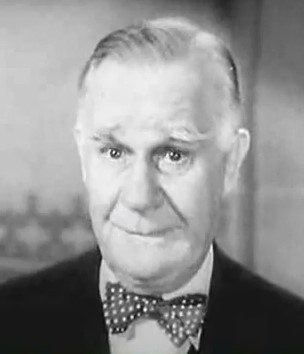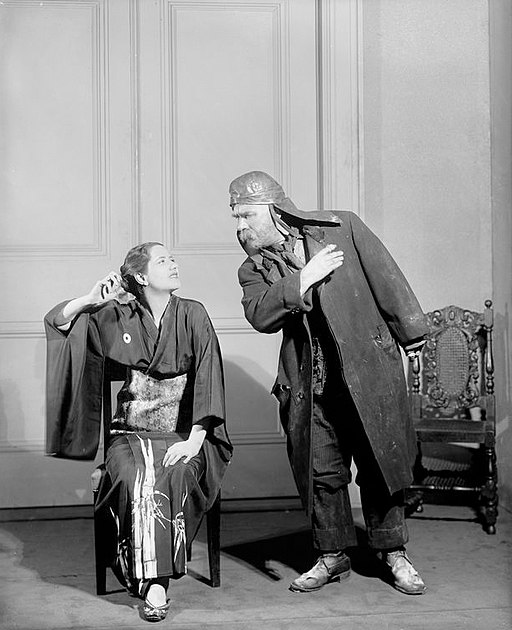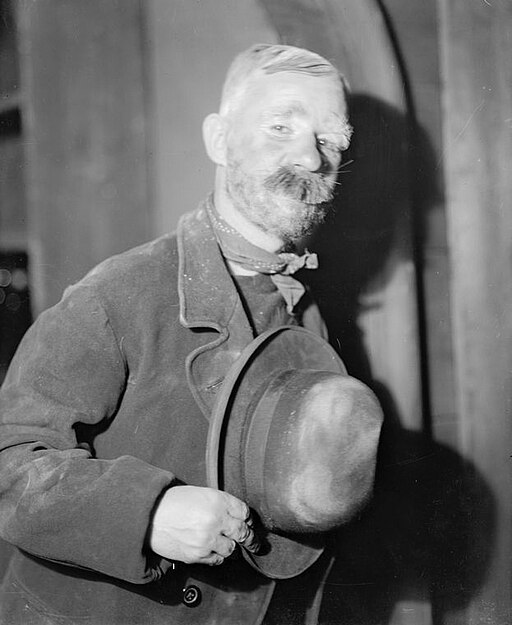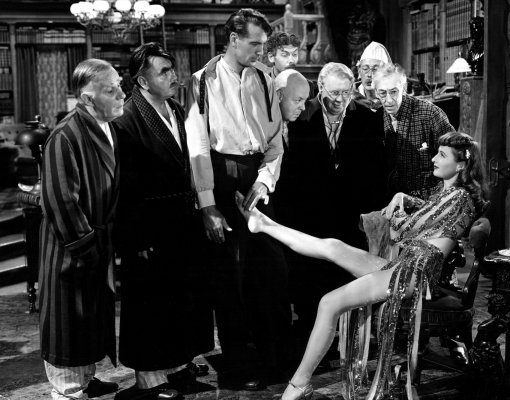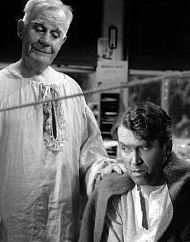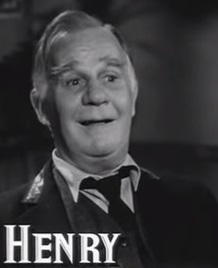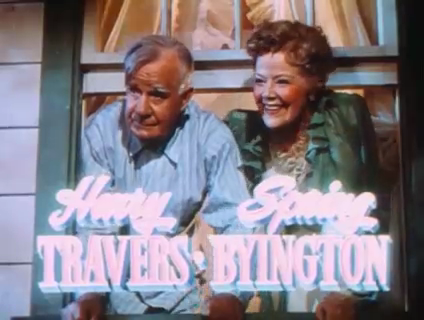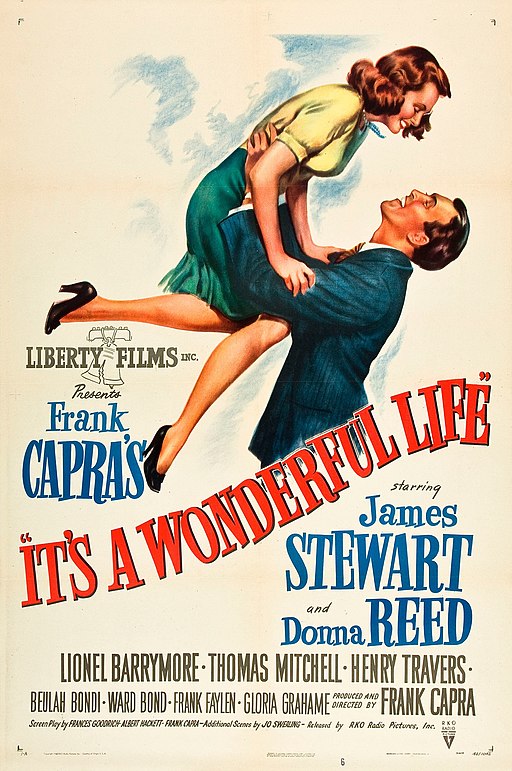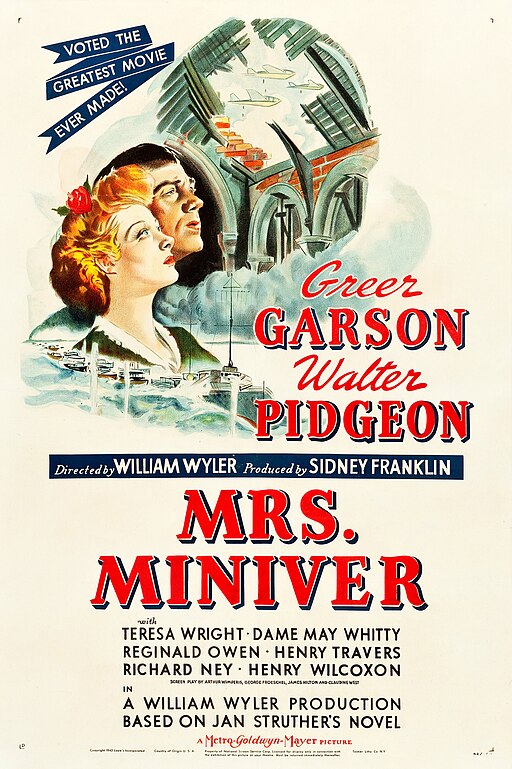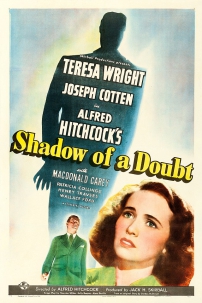Henry Travers
back| Full Name | Travers John Heagerty |
| Stage Name | Henry Travers |
| Born | March 5, 1874 |
| Birthplace | Prudhoe, Northumberland, England |
| Died | October 18, 1965 |
| Buried | Forest Lawn Memorial Park (Glendale), Glendale, California, USA |
| Married to | Amy Forrest-Rhodes |
| Children | He did not have any biological children, but he was a stepfather to Amy's daughter from her previous marriage |
| Notable films | The Bells of St. Mary's (1945) - It's a Wonderful Life (1946) - Mrs. Miniver (1942) - Shadow of a Doubt (1943) - The Invisible Man (1933) |
Henry Travers
Hollywood's Beloved Everyman
Henry Travers began his acting career on the English stage and later moved to the United States, where he continued his career on Broadway. He made his film debut in the 1930s and quickly became known for his character roles, often portraying kind-hearted and gentle characters.
His role as Clarence Odbody, the angel in "It's a Wonderful Life," remains one of his most beloved performances. This role has endeared him to generations of viewers and remains a staple of Christmas movie marathons.
Travers' contributions to cinema were recognized with an Academy Award nomination for Best Supporting Actor for his role in "Mrs. Miniver." Despite a relatively brief film career (about two decades), Travers left a lasting impact on the film industry with his memorable performances.
Related
Henry Travers (1874 – 1965)
Biography and Career Overview
Born as Travers John Heagerty on March 5, 1874, in Prudhoe, Northumberland, England, Henry Travers grew up in a family deeply rooted in the coal mining industry. However, Travers was drawn to a different path, showing an early interest in the performing arts.
Early Career and Path to Acting
Travers began his acting career in his native England, performing in various theater productions. He honed his craft on the English stage, developing a reputation for his dedication and talent.
In pursuit of broader opportunities, Travers emigrated to the United States in the early 1900s, where he continued to perform in stage productions, this time on Broadway. His stage work in America laid the groundwork for his eventual transition to film.
Transition to Film and Hollywood Career
Travers made his film debut in the 1930s, a late start by Hollywood standards, as he was already in his 50s. Despite this, he quickly established himself as a reliable character actor.
He was known for portraying kind, fatherly figures or sympathetic characters. This niche made him a sought-after actor for roles that required a gentle, reassuring presence.
Important Movies and Acclaim
His role in "Mrs. Miniver" (1942) as Mr. Ballard earned him an Academy Award nomination for Best Supporting Actor.
However, it was his portrayal of Clarence Odbody, the guardian angel in Frank Capra's "It's a Wonderful Life" (1946), that secured his place in cinematic history. This role resonated with audiences and remains a beloved character in film.
Personal Life and Marriages
Travers married Amy Forrest-Rhodes, a marriage that lasted until his death. While he had no biological children, he was a devoted stepfather to Amy's daughter from her previous marriage.
Outside of his acting career, Travers was known to be a private and humble man, preferring a quiet life away from the glitz of Hollywood.
Later Years and Death
After retiring from acting in the early 1950s, Travers lived a quiet life away from the public eye. He cherished his privacy and enjoyed a peaceful retirement.
Henry Travers passed away on October 18, 1965, in Hollywood, California. The cause of his death was arteriosclerosis, a condition involving the thickening and hardening of artery walls.
Legacy
Travers' legacy lives on through his memorable performances, particularly in "It's a Wonderful Life." He is remembered as an actor who brought warmth and humanity to his roles, leaving a lasting impact on the film industry and audiences worldwide.
A Video Tribute to Henry Travers:
Henry Travers’ Naturalistic Acting Style:
Henry Travers' acting style was characterized by a gentle, unassuming, and deeply empathetic presence, which made him a beloved figure in the era of classic Hollywood cinema. His performances were often marked by a nuanced subtlety and a warm, avuncular charm that resonated deeply with audiences. Here's a more detailed analysis of his acting style:
Understated and Naturalistic Approach:
- Travers was known for his understated acting style. He never overplayed a scene or character, instead opting for a naturalistic approach that made his characters seem more real and relatable. His performances were marked by a quiet dignity and an effortless authenticity.
Gentle, Kind-hearted Characters:
- He often portrayed kind, gentle characters who embodied a sense of wisdom and benevolence. This typecasting was a testament to his ability to project warmth and kindness through his screen presence. His roles were usually those of a supportive, nurturing figure, be it a doctor, a priest, or an angel, as in "It's a Wonderful Life."
Mastery of Subtle Expressions:
- Travers had a remarkable ability to convey deep emotions through subtle facial expressions and body language. He didn't rely on grand gestures or dramatic dialogues to express feelings; instead, he used a soft-spoken demeanor and a twinkle in his eye to convey his character's inner world.
The ‘Everyman’ Appeal:
- His characters often had an 'everyman' appeal. They were relatable and grounded, resonating with the common man's experiences and emotions. This relatability made him a favorite among audiences who saw in him a reflection of their own fathers, uncles, or neighbors.
Humor and Lightness:
- Travers also had a knack for injecting a gentle humor into his roles. Even in dramatic settings, he could bring a lightness that balanced the narrative, making his characters more endearing.
Versatility within Character Roles:
- While often cast in similar types of roles, Travers demonstrated versatility within that framework. Whether he was playing a small-town doctor or a heavenly angel, he brought a unique depth to each character, making them distinct and memorable.
Emotional Resonance:
- Travers' performances were emotionally resonant. He had the ability to touch the hearts of viewers, eliciting empathy and emotional responses. His portrayal of Clarence Odbody in "It's a Wonderful Life" is a prime example of this, as he brought an emotional depth to what could have been a simple, whimsical character.
Memorable Film Lines from Henry Travers:
From "It's a Wonderful Life" (1946)
"Every time a bell rings, an angel gets his wings."
- This line, spoken by Travers as Clarence Odbody, is one of the most famous in film history, often cited around Christmas time and synonymous with the movie's message of hope and the impact of individual lives.
"Strange, isn't it? Each man's life touches so many other lives. When he isn't around he leaves an awful hole, doesn't he?"
- This profound observation by Clarence highlights the film's central theme about the importance of every individual's life.
"You see, George, you've really had a wonderful life."
- Clarence says this to George Bailey, helping him to realize the value of his life and the positive impact he has had on others.
From "Mrs. Miniver" (1942)
"There'll always be roses."
- Travers' character, Mr. Ballard, delivers this line, reflecting the resilience and enduring nature of beauty and hope, even during the dark times of war.
From "The Bells of St. Mary's" (1945)
"If we just try hard enough, we can always manage, can't we?"
- As Horace P. Bogardus, Travers' character expresses a sentiment of perseverance and determination, which resonates with the film's themes.
Awards and Recognition:
Henry Travers, despite his impactful and memorable performances, particularly in the golden era of Hollywood, received limited recognition in terms of awards and nominations during his career. Here is an overview:
Academy Awards (Oscars)
- Nominated: Henry Travers received one Academy Award nomination in his career:
- 1942: He was nominated for the Best Supporting Actor Oscar for his role as Mr. Ballard in "Mrs. Miniver." This film was a significant success at the Oscars that year, winning several awards, including Best Picture.
Other Recognitions
- While Travers didn't accumulate a large list of awards or nominations, his roles, especially as Clarence Odbody in "It's a Wonderful Life," have received enduring acclaim.
- "It's a Wonderful Life" itself didn't win any Oscars at the time of its release but has since been recognized as one of the greatest films of all time and is a staple in American Christmas traditions. Travers' performance in this film, in particular, has been celebrated for decades.
Legacy
- Travers' legacy in cinema is more about the lasting impact of his performances than about the awards he received. His portrayal of gentle, kind-hearted, and moral characters has made a lasting impression on audiences and filmmakers alike.
- The lack of extensive awards does not diminish his contributions to the film industry. Actors like Travers, who consistently delivered heartfelt and authentic performances, have helped shape the art of cinematic storytelling.
Movies featuring Henry Travers:
1933
- "Reunion in Vienna": Travers played Father Krug in this romantic drama where an exiled archduke returns to Vienna and rekindles a romance with his former lover, now married to a psychoanalyst.
- "The Invisible Man": In this science fiction horror, he portrayed Dr. Cranley. The story follows a scientist who finds a way of becoming invisible, but in doing so, he becomes murderously insane.
1934
- "Death Takes a Holiday": Playing Baron Cesarea, Travers is part of a story where Death decides to take a human form to understand why humans fear him. During his stay, he finds himself falling in love with a woman.
1935
- "Four Hours to Kill!": This drama features Travers as a janitor in a story where a murderer is held by the police in a theater's backstage, waiting for his execution in four hours.
1936
- "The Dark Angel": Travers appears as Uncle Binnie in a romantic drama about a woman torn between two men, one of whom is presumed dead in World War I.
- "Three Godfathers": He plays Samuel 'Doc' Boone in this western about three outlaws who find a dying woman and her baby and vow to bring the infant to safety.
1937
- "The Last of Mrs. Cheyney": As Charles, Lord Elton, Travers is part of a story about a chic jewel thief in England who falls in love with one of her marks.
- "Quality Street": Playing Dr. Valentine Brown, the film is a romantic comedy about a woman who impersonates her own niece to win back a former suitor.
1938
- "The Sisters": Featuring Travers as Ned Elliott, this drama revolves around the story of three sisters and their life experiences as they leave their home to start new lives in San Francisco.
- "You Can't Take It with You": He played Mr. Poppins in this romantic comedy about a man from a family of wealthy snobs who becomes engaged to a woman from a good-natured but decidedly eccentric family.
1939
- "On Borrowed Time": Travers portrayed Dr. Evans in this fantasy drama where a man traps Death in a tree, thus preventing anyone in his town from dying.
1940
- "Edison, the Man": Playing General Powell, this biographical film tells the story of Thomas Edison's life and his many inventions.
1941
- "Ball of Fire": He was Professor Jerome in this comedy about a group of professors working on an encyclopedia who encounter a nightclub singer who provides them with a new source of slang terms.
- "High Sierra": Playing a father in this crime thriller, the film focuses on the last heist of an aging ex-con and his involvement with a young, vulnerable girl.
1942
- "Random Harvest": Travers as Dr. Sims is part of a story about an amnesiac World War I veteran who falls in love with a music hall star, only to suffer a second bout of amnesia.
1942
- "Mrs. Miniver": In this war drama, he played Mr. Ballard, a stationmaster who participates in the Dunkirk evacuation.
1943
- "Shadow of a Doubt": Travers portrayed Joseph Newton in this thriller about a young woman who discovers her visiting "Uncle Charlie" is not the man he seems to be.
1944
- "None But the Lonely Heart": Playing Dad Pettyjohn, the film is about a drifter who returns home and discovers his mother is in a relationship with a shady businessman.
1945
- "The Bells of St. Mary's": As Horace P. Bogardus, Travers is part of a story about a priest and a nun who work together to save a school from being shut down.
1946
- "It's a Wonderful Life": In this iconic film, Travers played Clarence Odbody, an angel sent from heaven to help a desperately frustrated businessman by showing him what life would have been like if he never existed.
1947
- "The Flame": He portrayed George McAllister in this crime drama about a woman who is blackmailed by her ex-boyfriend who is also planning a robbery.
1948
- "Beyond Glory": Playing President Robert Elwell, the film focuses on a court-martial of an American officer accused of collaborating with the enemy in World War II.
1949
- "The Girl from Jones Beach": In his final film role, Travers played Judge Bullfinch in a comedy about an illustrator who discovers his ideal woman in real life and attempts to find her.

